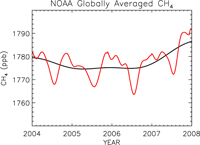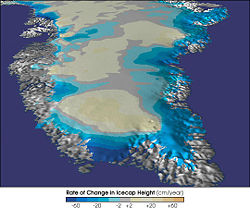Methane Gas in the atmosphere on the rise
 |
 Rate of Change in Ice Sheet Height in cm per year |
Source: NOAA
Methane is the second most potent greenhouse gas after carbon dioxide,
which increased by 0.6% last year.
Carbon Dioxide comes from burning fossil fuels. Methane comes from
landfills, natural gas released in the atmosphere, animal waste, and
decaying plants. It is ancient decaying plants that most worry scientists.
These are plants that are frozen in northern permafrost that has trapped
tremendous quantities of methane gas for millions of years. That permafrost
is melting due to global warming and scientists are concerned that the
methane gas will be released into the atmosphere. This creates a feedback
loop where the released methane further raises temperatures, which then
releases even more methane.
These types of feedback loops will grow exponentially once they get started
and there will be no good way to stop or slow them down. Other feedback
loops can also contribute to more global warming. As Arctic ice melts, more
ground and water are exposed to sunlight, which reflect less sunlight than
ice thus retaining more heat energy. This again raises temperatures, which
then releases more methane gas.
The big problem here is the Greenland Ice Sheet. This vast body of ice
covers 660,000 square miles. The ice is about 2 miles thick and contains
684,000 cubic miles of water. If all this ice melted it would raise sea
levels by 23 feet, inundating all of the world’s costal areas. Even a very
small amount of melting could have terrible effects on many coastal cities.
Temperatures are rising rapidly in the northern latitudes. Greenland will
become surrounded by warmer water. Will the ice melt? Yes. How fast will it
melt? That is the big question! Many scientists say hundreds of years. But
if warming increases faster than expected is could melt a lot faster than
many anticipate.